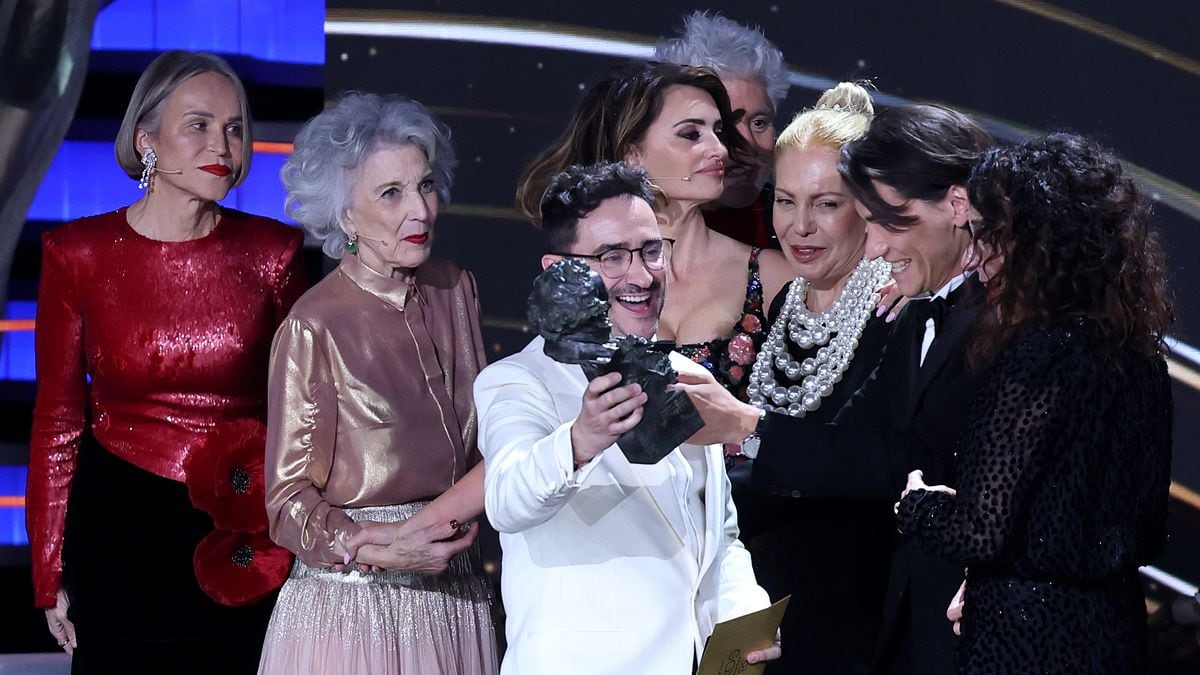In February 2018, Ekai Lersundi surrendered at the age of 16.
She had requested a hormonal treatment that never came, she struggled unsuccessfully to have her true gender identity recognized, and she couldn't take it anymore: Lersundi took his own life in her house.
“It was very sad.
However, she wrote a hopeful and bright farewell letter, trying to bring about a change in society with her drastic decision.
It may be that in that 2018 her reality was not part of the debate or the political agenda, but she prompted me ”, says the filmmaker Estibaliz Urresola Solaguren (Llodio, 38 years old).
There she started the path of
20,000 species of bees,
the Spanish film that today participates in the competition of the 73rd Berlinale, and that has achieved a profusion of praise in its first screening, the one destined for the press.
More information
Paul B. Preciado explodes genres with his self-portrait in 'Orlando'
If there were an applause meter,
20,000 species of bees
has been as well received as the two great favorites, the American
Past Lives,
by Celine Song, and the Mexican
Totem,
by Lila Aviles.
Urresola appreciates the compliments.
But unlike those two titles, based on the autobiographical experiences of her directors, the Basque filmmaker has taken the baton from other hands.
She “wanted the film to carry some of the luminosity of that letter, even if it only serves as inspiration.
The script is the result of many snippets from the lives of the families that I was able to interview, ”she says.
Hence, her protagonist, a trans girl, Aitor in the roles, Coco for her mother, Lucía inside her, is eight or nine years old.
Together with her mother and her older siblings, she moved from Bayonne (France), where she lives, to a town in the Spanish Basque Country to visit her maternal family for a few days.
There she will suffer the contrast of the looks of the adults and her family, who classify her as Aitor,
with that of a new friend (“In my school I know another girl with a penis,” she tells him) or that of her great-aunt, a beekeeper who will serve as a revealing mirror of the situation so that the mother (Patricia López Arnaiz) assumes what feel Lucia.
“Of the most exciting testimonies that they told me, I have ended up building a new family”, sums up the filmmaker.
The construction of identity
In
20,000 species of bees
The tension of the trans girl who struggles to find her voice occurs within other tensions, those that pit the rest of her family against each other: her mother's bad relationship with her grandmother, the heavy shadow of her deceased artist grandfather, the branch conservative cousins, the precarious sentimental balance of his parents' marriage... "Like a hive, which is made up of individuals, each with a mission and a sense of life, but who build a superior organism, because the hive is much more than a sum of individualities.
And this example allows me the intimate dialectic of each individual and the relationship of that experience with the collective.
Human beings need the group, their relationship, although it conditions us.
In a constant paradox, we want to vindicate ourselves as individuals.
And that is the key to the film”, says Urresola.
“Is the notion of identity private, intimate or mediated by the gaze of others?
It's a magma."
From the left, the actresses Itziar Lazkano and Sofía Otero, the director Estibaliz Urresola and the actress Patricia López Arnaiz, at the presentation of '20,000 species of bees'. TOBIAS SCHWARZ (AFP)
Urresola has a long career in the cinema behind him.
She has a degree in Audiovisual Communication from the Public University of the Basque Country, she has a master's degree in Film Direction and another in Film Business from Escac, the Film School of Catalonia.
She shot two shorts —Adri
(
2014) and
Polvo somos
(2020)— and a long documentary —Voces
de papel
(2016)—, before jobs accumulated in the post-pandemic period.
In the last Cannes competition, she presented the short film Cuerdas
, winner of the Forqué award in its category and a Goya candidate , at the Critics' Week
.
“It has been very intense.
strings
it was going to be shot a year earlier.
After the covid I took it forward and events began to overlap ”, he breaks down smiling.
“The casting process for the feature was starting when I shot the short.
Strings
premiered
in Cannes a month after the filming of
20,000 species...
And I accompanied the promotion of the short film while post-producing the feature.
It's been exhausting."
While he was writing the script for this family drama, the news was catching up with his work, until the start of his film's career coincided with the approval of the
trans law
in the Congress of Deputies.
“I started very freely.
I firmly believe that cinema is a tool for social transformation, because I have already experienced it in the same process as in my previous works.
And that once you premiere your work it belongs to the viewers, who will surely be asked new questions.
So when I uprooted
20,000 species of bees
I only thought about that process”, he reflects.
“But the gestation of it has gone very parallel, in an amazingly synchronized way, with the appearance of that debate.
I just hope that people understand that my film is to be enjoyed in a more emotional, less rational way than political talk.
That he understands that I build a look at the trans from another place”.
Estibaliz Urresola, on the set of '20,000 species of bees', with Sofía Otero.
That debate has been accompanied by "very frustrating moments."
The filmmaker knows why: “As a society, sometimes we lack tools, experiences, referents, language in the face of facts that are new to us.
Let's advance in the language, in the construction of legal elements of protection for people who do not see their individual rights protected”.
And after reflection, and taking great care of her words, she goes further.
“It is a complex issue.
The political subject is at the center of the debate.
And since feminism we have suffered centuries as invisible political subjects.
It has been very difficult for us to obtain the rights... but I do not find that our rights are in danger by embracing other identities that still enjoy even less privileges than the cis woman.
We must accompany and show solidarity with these others and others,
with those groups that need support”.
Luckily, “childhood is in another war, their understanding is ahead.
The older ones are the ones who are still governed by bases created decades ago.
And that scares some.
The new generations have a different imaginary”.
A narratively more formal film about
20,000 species of bees
may reach a larger audience (it will be released commercially on April 21) than a more risky bet like
Orlando, my political biography,
by Paul B. Preciado, the other Spanish contribution at the Berlinale to the portrait of the trans world in today's society.
The packaging within a family drama of the opening to the life of that trans girl is more digestible for most of the theater public.
All in all, both titles are strongly committed to integration.
As Urresola recalls, that was the message that Ekai Lersundi left in writing: "He only asked that the boys and girls who came after him find a more habitable place."
Subscribe to continue reading
Read without limits
Keep reading
I'm already a subscriber


/cloudfront-eu-central-1.images.arcpublishing.com/prisa/6TRSJLX3DFEYXDBHHHN476MDHI.jpg)



/cloudfront-eu-central-1.images.arcpublishing.com/prisa/IFZN3QHL2BB4TBAPMKIOA7ILF4.jpg)


